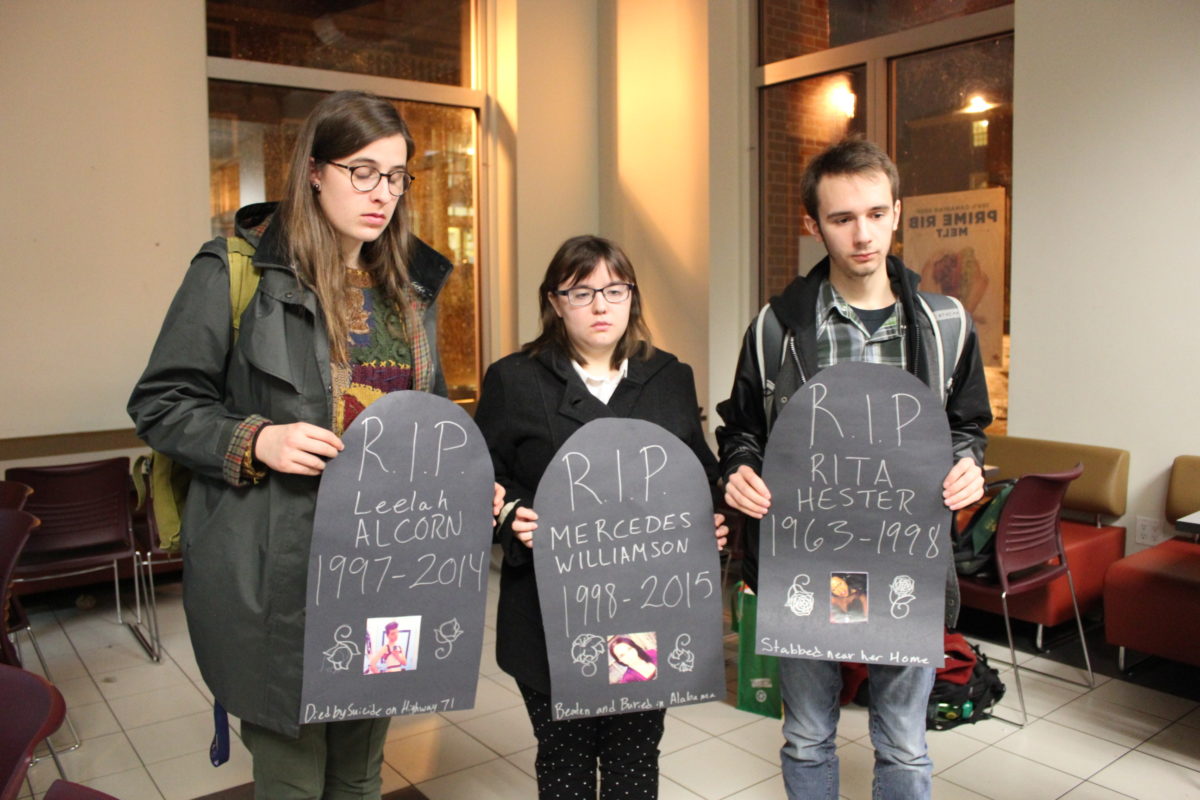
The Queer and Allied Society held a Trans Day of Remembrance ceremony on campus on Friday.
This is the first year STU has flown the transgender pride flag.
This day was founded in 1998 after transgender woman Rita Hester’s murder. Host Al Cusack referred to it as a “17-year-long funeral
According to NBC and MotherJones, more transgender people were killed in 2015 than any other year. .”
Cusack says transgender people face many day-to-day obstacles, such as being judged for the way they dress and being misnamed and misgendered.
“While these seem very trivial, they amalgamate and come from the same place as the aggression that leads to what we’re here for,” Cusak said.
“I fear violence,” said Martin René Demerchant, a transgender man. “I think people need to remember that violence comes in a lot of different forms that aren’t just physical. Denial of healthcare is violence, job discrimination is violence, misgendering is violence.”
At the ceremony, people held signs with names and photos of those murdered, read poetry, and told stories of people like Leelah Alcorn, whose suicide led to “Leelah’s Law” banning conversion therapy, which is a means of convincing one to be heterosexual and cisgendered.
Cusack, who identifies as non-binary, said while Cusak has never experienced physical violence themselves, they have been witness to it.
That’s not to say Cusak doesn’t face any obstacles. Cusack finds professors often don’t know how to refer to transgender people, and Cusak feels forced to use the gender neutral bathrooms in George Martin Hall.
“You get aware that it’s the people who are known who end up on these lists [of beaten and murdered people],” they said. “While I feel incredibly safe here in Fredericton, the more people who know who I am, the more nervous I get.”
Later that evening, the Fredericton Gender Minorities group held a similar ceremony at the Crowne Plaza, where 73 names of transgender people murdered this year were read out loud.
Mable Wheeler, one of the speakers, said New Brunswick is the only province that does not yet cover gender-confirming surgery.
“What’s covered is your consultation for hormone replacement therapy and everything else has to be funded out of pocket,” said Wheeler.
Many in the gender minorities community believe unacceptance and discrimination come from a fear of the unknown.
“When gay men started to be accepted, they were a ‘danger’ to men in men’s bathrooms,” said Wheeler. “Now it’s trans girls who are a ‘danger’ to women in bathrooms, but there hasn’t been one reported case of violence against a cis women in a bathroom. Trans women are just trying to pee.”
Erin Fredericks, who helped organize the on campus event, feels it’s important for cisgender people educate themselves about the trans community, because the education system is largely lacking.
Wheeler rsays being transgender, agender, or gender fluid is not a choice and it can be complicated. She counters questions like “when did you know you were trans” with “when did you realize you were cisgender?”
